Turo, Asheville airport mend car-sharing service dispute. Here's the resulting agreement.

ASHEVILLE - Though it hasn’t been resolved in the courts, a short-lived tiff between the Greater Asheville Regional Airport Authority and a peer-to-peer vehicle sharing company has come to an end.
Turo, a kind of "Airbnb for cars," and the Asheville Airport told the Citizen Times that they have come to an amicable agreement over how the app and website-based company can operate in conjunction with airport facilities.
The Airport authority in December filed a lawsuit in Buncombe County Superior Court claiming that Turo and people who use it to “host” cars — putting them up for rent on the company’s app and website — were not following airport policy by allowing transactions on the property.
While the case had not been dismissed as of Jan. 30, Turo and airport spokespeople confirmed there was a recent resolution to the dispute.
More:Asheville airport lawsuit against ‘Airbnb of cars’ confuses hosts trying to make a living
More:Airport authority sues ‘Airbnb of cars’ app, users for operating ‘deceptive’ business
“I am reaching out today to provide you with an update on the situation at Greater Asheville Regional Airport,” Turo spokesperson Catherine Mejia told the Citizen Times in a Jan. 26 email. “I’m pleased to share that Turo and airport authorities have resolved the dispute and have entered into a permit for peer-to-peer car sharing at the airport. This solution means more consumer choice for travelers and economic opportunity for local residents who want to share their cars on Turo.”
Final Operating Agreement - TURO Executed by Greater Asheville Regional Airport Authority 1-19-23 by Andrew Jones on Scribd
When asked if there indeed had been a resolution, airport spokesperson Tina Kinsey said “Yes, I can confirm this.”
She also provided the 26-page agreement between Turo and the airport dated Jan. 19 and signed by GARAA president and CEO Lew Bleweis and Turo president Alex Benn.
The agreement went into effect retroactively on Jan. 15 and lasts through Jan. 14, 2024.
Among numerous other stipulations, the document states Turo must pay 10% of its gross receipts “for any month in the period in which this agreement is in effect.”
For hosts, the document is specific about exactly how they are to operate and meet customers at the airport, including the fees they have to pay for going in and out of the parking area and where they can leave their vehicles.
The policy may help clear up confusion hosts were facing while a specific agreement between the airport and Turo wasn’t clearly outlined.
More:After record year, Asheville Airport breaks ground on $55M air traffic control tower
More:Amid growth, Asheville Regional Airport gets clean audit, gets year-round NYC nonstop
Resolution on the matter comes in a peak year for Asheville-area air travel. According to recently released figures from the airport, 2022 was a record-breaking year, with more than 1.8 million passengers flying to or from Asheville Regional Airport, a 29% increase over 2021 and the highest number of passengers it has served in one year.
According to the lawsuit, more than 1.4 million passengers went through the Fletcher-area airport in 2021. It’s currently working on a $272 million terminal modernization and expansion project including the construction of a new air traffic control tower, projects slated for completion by 2026.
Officials broke ground on that terminal project Jan. 25.
Growing pains like the legal dispute the airport raised against Turo are not its first run-in with emerging transportation-sharing platforms.
In early 2018, airport officials said all ground transportation services, including Uber and Lyft, need to pay per-trip pickup fees and follow new monitoring systems. Uber and Lyft initially declined to pay the fees, raising concerns among their drivers that the change could cut off a major source of income.
Uber, Lyft and the airport ultimately came to an understanding on the matter.
Andrew Jones is an investigative reporter for the Asheville Citizen Times, part of the USA TODAY Network. Reach him at @arjonesreports on Facebook and Twitter, 828-226-6203 or arjones@citizentimes.com. Please help support this type of journalism with a subscription to the Citizen Times.
This article originally appeared on Asheville Citizen Times: Asheville airport, Turo seem to resolve peer-to-peer car sharing tiff

